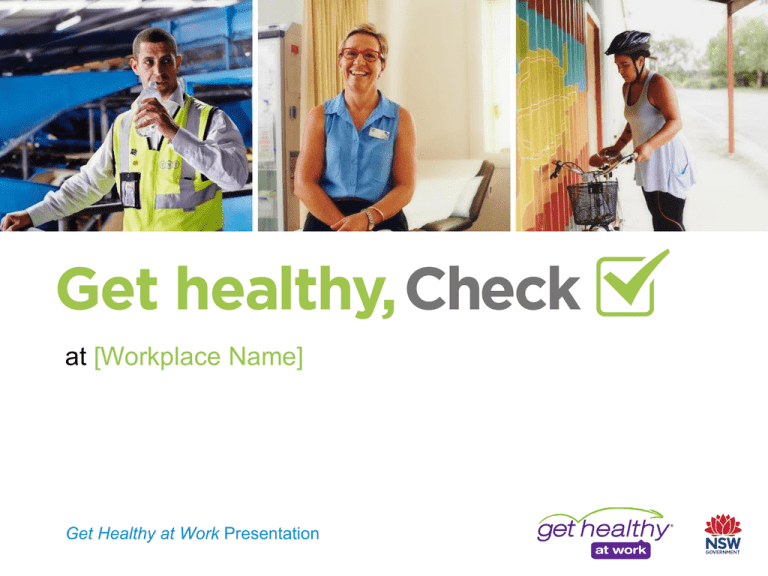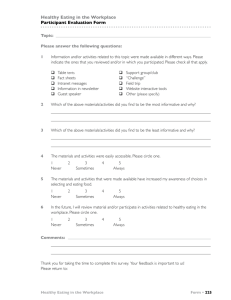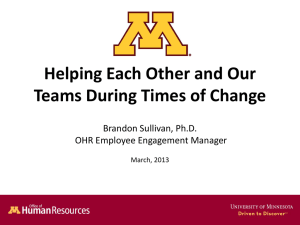GetHealthyatwork-PPT
advertisement

at [Workplace Name] Get Healthy at Work Presentation Health of Australian workers In 2011-12: 60% of Australian adults were classified as overweight or obese. In 2010: - Around 1/3 of working-age Australians were reported to have at least one chronic disease1 - 96% had at least one chronic disease risk factor2, while the majority (72%) had multiple 1 Lifestyle-related diseases such as type 2 diabetes can be prevented through healthy lifestyle choices A chronic disease is an illness that is prolonged in duration, does not often resolve spontaneously, and is rarely cured completely, e.g. cancer, cardiovascular disease, diabetes 2 Risk factors for chronic disease include smoking, being overweight or obese, drinking alcohol at harmful levels and not undertaking adequate physical activity Get Healthy at Work Get Healthy at Work [Workplace Name] Get Healthy at Work supports our efforts to improve workplace health by focusing on: Healthy weight Physical activity Healthy eating Active travel Smoking Alcohol Get Healthy at Work Program Cycle 1. Get the ball rolling 2. Work out your needs and develop a plan 3. Implement your program 4. Monitor and review your program Get Healthy at Work services provides Workplace Health Program All the tools, templates and resources we need to: Prioritise a single health issue Develop a workplace health action plan Implement, monitor and review our program Continuously address health issues, one-by-one, over time Brief Health Check: A free and confidential service provided to our workers online or by trained health professionals at our workplace Provides immediate feedback on an individual’s risk of developing type 2 diabetes and heart disease, and how to make changes for better health With referrals to lifestyle coaching programs and other health services Unhealthy workers compared to health workers Unhealthy workers Healthy workers Self-rated performance 7 / 10 Self-rated performance 8.5 / 10 High fat diet Healthy diet Low energy levels and poor concentration Fit, energetic and alert Obese or overweight Normal body weight Irregular sleep patterns More attentive at work and better sleep patterns What to expect Within a few months Employee engagement Team cohesiveness Within 1-2 years Health knowledge Job satisfaction Corporate image Example of healthy eating in the workplace Healthy people Support a workplace culture where workers stop for meal breaks and leave their work area to eat lunch Hold a healthy eating challenge (encouraging both managers and workers to join in) Healthy places Display healthy eating messages in areas where decisions are made about food Provide access to drinking water Encourage workers to use refillable water bottles at their worksite Provide kitchen facilities to encourage food storage and preparation Healthy policy Develop a healthy eating policy that includes vending machines and catering in the workplace Next steps Formalise [Workplace Name’s] commitment to the program Involve our workers Plan for coordinating our Brief Health Checks Workplace health programs make good sense. Any questions? For more details visit gethealthyatwork.com.au WC01499 0414











